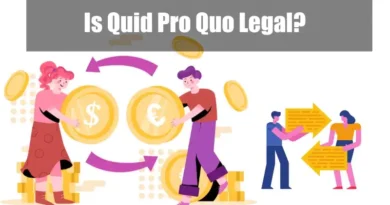Are Quid Pro Quo Donations Illegal? U.S. vs U.K.
Quid pro quo donations are not illegal but come with specific legal and tax regulations. In the U.S. and U.K., only the portion of the donation that exceeds the value of the goods or services received in return is tax-deductible. Charities must disclose clearly to donors about the deductible amount and the fair market value of the benefits. Non-compliance with these rules can lead to penalties for the charity and potential issues for the donor, especially concerning tax relief.
Therefore, while legal, these donations require careful handling to ensure compliance with the law.
Takeaways
| Aspect | United States | United Kingdom |
|---|---|---|
| Legality | Quid pro quo donations are legal but must adhere to specific tax and disclosure regulations. | Legal with specific regulations, particularly under the Gift Aid scheme. |
| Tax Deductibility | Only the portion of the donation exceeding the value of received goods/services is tax-deductible. | Similar rule applies; only the portion exceeding the value of received benefits is eligible for tax relief. |
| Disclosure Requirements | Charities must provide written acknowledgment for donations over $75, detailing the deductible portion. | Benefits must not exceed 5% of the donation or £2,500, whichever is lower, for Gift Aid eligibility. |
| Penalties for Non-Compliance | Fines of $10 per contribution, up to $5,000 per fundraising event, for failure to provide required disclosures. | Incorrect Gift Aid claims can lead to penalties and repayment of any Gift Aid received. |
| Valuation of Benefits | Goods/services must be valued at fair market value. Example: $200 ticket with $50 meal value = $150 deductible. | Goods/services must also be valued at fair market value. Example: £2,500 donation with £2,000 benefit = £500 deductible. |
| Gift Aid Scheme | Not applicable. | Benefits must stay within strict limits to qualify for Gift Aid. Excessive benefits disqualify the donation from Gift Aid. |
| Real-World Examples | Charity galas, auctions, where the deductible amount is calculated based on the value of goods/services received. | Similar events, with added Gift Aid considerations, especially for large donations with significant benefits. |
Let’s explore this in detail:
What Are Quid Pro Quo Donations?
A quid pro quo donation occurs when a donor contributes to a charitable organization and, in return, receives goods or services. Unlike typical donations where the full amount is tax-deductible, in quid pro quo situations, only the portion of the donation that exceeds the value of the received goods or services is tax-deductible. For example, if you pay $200 for a charity gala ticket where the dinner is valued at $50, only $150 is considered a charitable contribution.

U.S. Laws on Quid Pro Quo Donations
The Internal Revenue Service (I.R.S.) has specific regulations governing quid pro quo donations in the United States. Charities must provide a written acknowledgment to the donor detailing the tax-deductible portion of the donation and a good-faith estimate of the value of the goods or services received. This disclosure is mandatory if the donation exceeds $75.
Failure to comply with these I.R.S. rules can result in penalties, including a fine of $10 per contribution for each failure to provide the required written disclosure, up to a maximum of $5,000 per fundraising event, as outlined in Section 6714 of the I.R.S. Code.
Additionally, charities must accurately value the goods or services provided to donors. This valuation is typically based on the fair market value—the price at which the item or service would sell in the marketplace.
The I.R.S. strictly ensures that the charity and the donor adhere to these valuation and reporting requirements to maintain transparency and fairness in charitable contributions.

U.K. Laws on Quid Pro Quo Donations
Quid pro quo donations are similarly regulated in the United Kingdom, though the framework differs slightly. The U.K. has specific guidelines under the Gift Aid scheme, where donations are enhanced by a government contribution of 25% of the donation amount. However, if the donor receives a benefit in return, the donation may not qualify for Gift Aid, or only a portion may qualify.
The U.K. law stipulates that for donations to be eligible for tax relief under Gift Aid, the value of any benefit the donor receives must not exceed certain limits. According to HMRC guidelines, for donations over £1,000, the benefit limit is 5% of the donation amount, up to a maximum of £2,500. For example, if a donor contributes £1,000, the maximum value of any benefit received must not exceed £50 for the donation to remain fully eligible for Gift Aid. If the benefit exceeds this threshold, the excess portion of the donation is not eligible for tax relief.

Real-World Examples and Compliance
In the U.K., a similar approach applies. If you pay £2,500 for a holiday package worth £2,000, only the £500 difference can be considered a charitable donation for tax purposes. However, Gift Aid, a tax relief program, cannot be similarly claimed on quid pro quo donations. For Gift Aid to apply, the charity must be registered, and any benefits received must fall within strict limits. The U.K. rules are slightly more flexible with ‘small donation’ exemptions or if benefits represent a small percentage of the total donation, but these are separate from standard quid pro quo donations.
Penalties for Non-Compliance
U.S. and U.K. laws penalize charities that fail to provide accurate disclosures or incorrectly value donor benefits. In the U.S., failure to provide proper acknowledgment can result in fines and potentially jeopardize the tax-deductibility of donations for the donor. In the U.K., incorrect claims under the Gift Aid scheme can lead to penalties and the need to repay any Gift Aid received.

Conclusion
Quid pro quo donations are a vital part of charitable fundraising, but they come with specific legal obligations that charities and donors must be aware of. Understanding the laws in the U.S. and the U.K. is crucial for ensuring that these donations are handled correctly and that both parties can enjoy the intended tax benefits without running afoul of regulations.
Consulting with a tax advisor or legal professional is recommended for further information on quid pro quo donations and the specific legal requirements.
Compliance not only avoids penalties but also maintains the integrity of charitable contributions.
FAQ
What constitutes a quid pro quo contribution in the U.S.?
A quid pro quo contribution is a payment made to a charity by a donor who receives goods or services in return. The donor’s deductible amount is the payment minus the fair market value of the goods or services received.
What are the disclosure requirements for charities receiving quid pro quo contributions in the U.S.?
Charities must provide a written disclosure statement to donors who make a quid pro quo contribution exceeding $75. This statement should inform the donor that the deductible amount is limited to the excess of the contribution over the fair market value of the goods or services received and provide a good faith estimate of that fair market value.
Are there exceptions to the disclosure requirement in the U.S.?
Yes, disclosures are not required if:
- The goods or services have insubstantial value as defined by IRS guidelines.
- There is no donative element involved in the transaction (e.g., purchases from a museum gift shop).
- Only intangible religious benefits are provided to the donor.
- The donor makes a payment of $75 or less per year and receives only annual membership benefits that consist of rights or privileges that can be exercised frequently during the membership period or admission to events open only to members with a per-person cost within IRS limits for low-cost articles.
What penalties can a charity face for failing to provide the required disclosure statement in the U.S.?
If a charity fails to provide the required disclosure statement for a quid pro quo contribution over $75, it may be subject to a penalty of $10 per contribution, not to exceed $5,000 per fundraising event or mailing.
How should a charity determine the fair market value of goods or services provided to donors in the U.S.?
A charity should make a good faith estimate of the fair market value of the goods or services provided to donors. This estimate should reflect the price at which the charity would sell the goods or services to the general public.
Can a donor deduct the full amount of a quid pro quo contribution in the U.S.?
No, the donor can only deduct the amount of the contribution that exceeds the fair market value of the goods or services received. For example, if a donor gives $200 to a charity and receives a benefit valued at $50, the deductible amount is $150.
What are “intangible religious benefits,” and how do they affect quid pro quo contributions in the U.S.?
Intangible religious benefits are benefits a religious organization provides that are not typically sold in commercial transactions outside the donative context. Examples include admission to a religious ceremony. When only intangible religious benefits are provided, the charity is not required to provide a disclosure statement, and the donor may deduct the full contribution amount.
Are there specific record-keeping requirements for donors making quid pro quo contributions in the U.S.?
Donors must obtain and keep records to substantiate their charitable contributions. For quid pro quo contributions over $75, the charity’s disclosure statement is part of the donor’s records. Without this statement, the donor may be unable to deduct the contribution.
How do membership benefits affect the disclosure requirements for quid pro quo contributions in the U.S.?
If a donor makes a payment of $75 or less per year and receives only annual membership benefits that consist of rights or privileges that can be exercised frequently during the membership period (excluding the right to purchase tickets for college athletic events) or admission to events open only to members with a per-person cost within IRS limits for low-cost articles, the charity is not required to provide a disclosure statement.
What steps can charities take to ensure compliance with quid pro quo contribution regulations in the U.S.?
Charities should:
- Develop procedures to identify quid pro quo contributions.
- Provide timely and accurate disclosure statements to donors.
- Maintain records of contributions and the corresponding goods or services provided.
- Train staff and volunteers involved in fundraising on the requirements for quid pro quo contributions.
By following these steps, charities can help ensure compliance with IRS regulations and maintain donor trust.
What is a quid pro quo donation in the U.K.?
A quid pro quo donation occurs when a donor provides a gift to a charity and receives goods or services in return. For example, purchasing a ticket to a charity gala where part of the ticket price covers the event’s cost and part is a donation.
How does Gift Aid apply to quid pro quo donations in the U.K.?
Gift Aid allows charities to claim an extra 25p for every £1 donated by U.K. taxpayers. However, for donations where the donor receives a benefit, the value of the benefit must not exceed certain limits for the donation to qualify for Gift Aid. As of the latest guidelines, the benefit thresholds are:
- 25% of the donation for amounts up to £100.
- £25 for donations between £100 and £1,000.
- 5% of the donation for amounts over £1,000, up to a maximum benefit of £2,500.
If the value of the benefit exceeds these limits, the donation does not qualify for Gift Aid.
Are there exceptions to the benefit limits under Gift Aid in the U.K.?
Yes, certain benefits are disregarded when assessing the value received by the donor:
- Token benefits: Low-value items like stickers or bookmarks.
- Rights of membership: Rights that allow donors to attend meetings or receive newsletters.
- Admission to charity property: Free or discounted entry to property preserved by a charity.
These exceptions are designed to encourage donations while allowing charities to offer modest incentives.
What are the tax implications for donors making quid pro quo donations in the U.K.?
Donors can only claim tax relief on the portion of the donation that exceeds the value of any benefits received. For instance, if a donor gives £100 to a charity and receives a benefit valued at £30, only £70 is eligible for tax relief.
What are the disclosure requirements for charities receiving quid pro quo donations in the U.K.?
Charities must inform donors of the value of any benefits received in return for their donation. This disclosure ensures transparency and helps donors understand the tax implications of their contributions.
How should charities determine the value of benefits provided to donors in the U.K.?
Charities should assess the fair market value of any goods or services provided to donors. This valuation should reflect the price at which the item or service would be sold to the general public.
Are there penalties for charities that fail to comply with quid pro quo donation regulations in the U.K.?
While specific penalties can vary, charities that do not adhere to regulations may face sanctions from the Charity Commission or HM Revenue and Customs (HMRC). Non-compliance can lead to reputational damage and potential financial penalties.
Can companies claim tax relief on quid pro quo donations in the U.K.?
Companies can claim tax relief on charitable donations, but the rules differ from those for individuals. If a company receives significant benefits in return for a donation, the payment may be considered sponsorship rather than a donation, affecting the tax treatment.
How does the Bribery Act 2010 relate to quid pro quo donations in the U.K.?
The Bribery Act 2010 requires organizations to ensure that donations are not used as a means to secure inappropriate advantages. For example, a donation should not be linked to the offer of a university place for a relative. Organizations must have policies in place to prevent such practices.
What steps can charities take to ensure compliance with quid pro quo donation regulations in the U.K.?
Charities should:
- Develop clear policies on accepting donations and providing benefits.
- Train staff and volunteers on the legal implications of quid pro quo donations.
- Maintain detailed records of donations and associated benefits.
- Regularly review practices to ensure alignment with current regulations.
By implementing these measures, charities can uphold legal standards and maintain public trust.









